
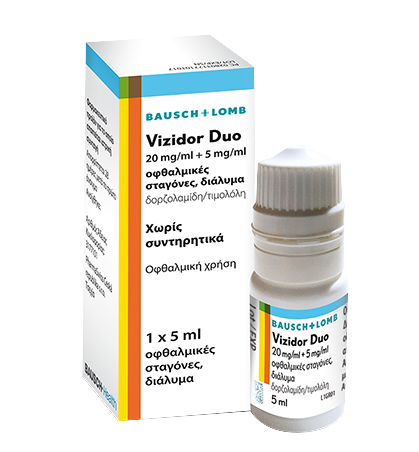
Vizidor Duo

Ask a doctor about a prescription for Vizidor Duo

How to use Vizidor Duo
Leaflet accompanying the packaging: information for the user
Vizidor Duo, (20 mg + 5 mg)/ml, eye drops, solution
Dorzolamide + Timolol
Read the leaflet carefully before using the medicine, as it contains important information for the patient.
- Keep this leaflet, so you can read it again if you need to.
- If you have any further questions, ask your doctor or pharmacist.
- This medicine has been prescribed for you only. Do not pass it on to others. It may harm them, even if their symptoms are the same as yours.
- If you experience any side effects, including any not listed in this leaflet, please tell your doctor or pharmacist. See section 4.
Table of contents of the leaflet
- 1. What is Vizidor Duo and what is it used for
- 2. Important information before using Vizidor Duo
- 3. How to use Vizidor Duo
- 4. Possible side effects
- 5. How to store Vizidor Duo
- 6. Contents of the pack and other information
1. What is Vizidor Duo and what is it used for
Vizidor Duo contains two active substances: dorzolamide and timolol.
- Dorzolamide belongs to a group of medicines called "carbonic anhydrase inhibitors".
- Timolol belongs to a group of medicines called "beta-adrenergic blockers".
Both active substances reduce pressure in the eye, but work in different ways.
Vizidor Duo is recommended for the treatment of glaucoma to reduce elevated eye pressure,
when eye drops containing only beta-adrenergic blockers are not sufficient.
Vizidor Duo eye drops are a sterile solution that does not contain preservatives.
2. Important information before using Vizidor Duo
When not to use Vizidor Duo
- if you are allergic to dorzolamide, timolol, or any of the other ingredients of this medicine (listed in section 6);
- if you currently have or have had respiratory problems, such as asthma or severe chronic obstructive pulmonary disease (severe lung disease that can cause wheezing, difficulty breathing, and/or persistent cough);
- if you have a slow heart rate, heart failure, or irregular heart rhythm (irregular heartbeat);
- if you have severe kidney disease or kidney problems, or have had kidney stones in the past;
- if you have excessive acidification of the blood due to the accumulation of chloride ions in the blood (hyperchloremic acidosis).
If you are not sure whether you can use this medicine, you should consult your doctor or pharmacist.
Warnings and precautions
Before starting to use Vizidor Duo, you should discuss it with your doctor.
You should inform your doctor about all diseases and eye problems you have now or have had in the past, such as:
- coronary artery disease (symptoms may include a feeling of pain or pressure in the chest, shortness of breath, or choking), heart failure, low blood pressure;
- heart rhythm disturbances, such as slow heartbeat;
- breathing problems, asthma, or chronic obstructive pulmonary disease;
- diseases related to poor blood circulation (such as Raynaud's disease or Raynaud's syndrome);
- diabetes, as timolol may mask the subjective and objective symptoms of low blood sugar;
- hyperthyroidism, as timolol may mask its subjective and objective symptoms. If you have had contact hypersensitivity to silver in the past, you should not use this medicine.
Before surgery, you should inform your doctor about the use of Vizidor Duo, as timolol may affect the action of certain medicines used during anesthesia.
You should also inform your doctor about any allergies or anaphylactic reactions, including hives, facial, lip, tongue, and/or throat swelling, which can cause difficulty breathing or swallowing.
You should tell your doctor if you have muscle weakness or diagnosed myasthenia (Myasthenia gravis).
You should contact your doctor immediately if you experience eye irritation or any new eye problems, such as eye redness or eyelid swelling.
If you suspect that Vizidor Duo is causing an allergic reaction or hypersensitivity (e.g., skin rash, severe skin reaction, or eye redness and itching), you should stop using this medicine and contact your doctor immediately.
You should tell your doctor if you experience an infection or injury to the eyeball, you are going to have eye surgery, or you experience a reaction accompanied by the appearance of new or worsening symptoms.
After administration to the eye, Vizidor Duo may affect the whole body.
Vizidor Duo has not been studied in patients using contact lenses. Before using Vizidor Duo, you should consult your doctor if you wear soft contact lenses.
Children
Experience with the use of Vizidor Duo (solution with preservative) in infants and children is limited.
Elderly
Studies using Vizidor Duo have shown that the action of this medicine (solution with preservative) in elderly and younger patients was similar.
Use in patients with liver function disorders
You should inform your doctor about any liver problems you have now or have had in the past.
Vizidor Duo and other medicines
Vizidor Duo may affect the action of other medicines or other medicines you are taking may affect the action of this medicine, including other eye drops used to treat glaucoma.
You should tell your doctor if you are taking or plan to take medicines that lower blood pressure, medicines used for heart diseases or diabetes. You should tell your doctor or pharmacist about all medicines you are taking or have taken recently or plan to take.
This is especially important if you:
- are taking medicines that lower blood pressure or are used for heart diseases (such as calcium channel blockers, beta-adrenergic blockers, or digoxin);
- are taking medicines used for heart rhythm disturbances or to restore a regular heart rhythm, such as calcium channel blockers, beta-adrenergic blockers, or digoxin;
- are using other eye drops containing beta-adrenergic blockers;
- are taking other carbonic anhydrase inhibitors, such as acetazolamide;
- are taking monoamine oxidase inhibitors (MAOIs);
- are taking medicines with a parasympathomimetic action, which may be prescribed to facilitate urination. Parasympathomimetic medicines are also sometimes used to restore normal bowel movements;
- are taking opioid medicines, such as morphine, used to treat moderate or severe pain;
- are taking antidiabetic medicines;
- are taking antidepressant medicines, such as fluoxetine, paroxetine;
- are taking sulfonamides;
- are taking quinidine (used to treat heart diseases and some types of malaria).
Pregnancy and breastfeeding
If you are pregnant or breastfeeding, think you may be pregnant, or plan to have a child, you should consult your doctor or pharmacist before using this medicine.
Use during pregnancy
Vizidor Duo should not be used during pregnancy unless your doctor considers it necessary.
Use during breastfeeding
Vizidor Duo should not be used during breastfeeding. Timolol may pass into human milk.
Driving and using machines
No studies have been conducted on the effect of the medicine on the ability to drive or use machines. Some side effects associated with the use of Vizidor Duo, such as blurred vision, may affect the ability to drive or use machines. You should not drive or use machines until you feel better or your vision returns to normal.
3. How to use Vizidor Duo
This medicine should always be used exactly as your doctor has told you. If you are not sure, ask your doctor or pharmacist. The correct dose and duration of treatment will be determined by your doctor.
Recommended doseis one drop of the medicine administered to the affected eye (eyes) in the morning and evening.
If Vizidor Duo is used with other eye drops, you should wait at least 10 minutes between administering the different eye drops.
Do not change the dose of the medicine without consulting your doctor.
If you have difficulty administering the eye drops, you should ask a family member or caregiver for help.
You should avoid touching the tip of the dropper bottle with your eye or the area around your eye. This may cause eye injury. The eye drop solution may become contaminated with bacteria, which can cause eye infection, leading to serious eye damage or even vision loss.
To avoid contaminating the multiple-dose container, you should protect the dropper tip from contact with any surface.
Instructions for use
Before administering the eye drops:
- You should wash your hands before opening the bottle.
- Do not use this medicine if the seal on the bottle neck is broken before its first use.
- When using the bottle for the first time, before administering the eye drops, you should test the bottle with the dropper by slowly squeezing it until one drop is released from the bottle. Do this away from your eye.
- If you are sure you can administer one drop at a time, you should take the most comfortable position for administering the eye drops (you can sit, lie on your back, or stand in front of a mirror).
Administration:
- 1. You should hold the bottle directly below the cap, which you should unscrew to open the bottle. Do not touch the tip of the bottle to avoid contaminating the solution.
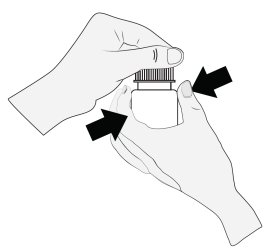
- 2. You should tilt your head back and hold the bottle above your eye.
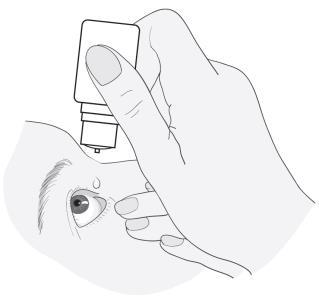
- 3. Pull the lower eyelid down and look up. You should gently squeeze the middle part of the bottle until the drop is easily administered to your eye. Remember that there may be a few seconds' delay between squeezing the bottle and the drop being released from the bottle. Do not squeeze the bottle too hard.
If you have any doubts about administering the medicine, you should consult your doctor, pharmacist, or nurse.
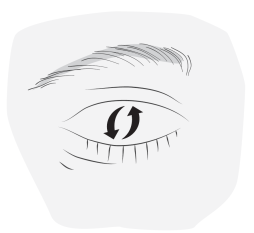
- 4. To spread the drop over the surface of the eye, you should blink several times.
- 5. Close your eye and press the inner corner of your eye with your finger for about two minutes. This helps prevent the medicine from entering the entire body.
- 6. If your doctor has prescribed the medicine for both eyes, you should repeat the actions described in points 2 to 5. Sometimes only one eye needs treatment, and your doctor will tell you which eye is affected and needs treatment.
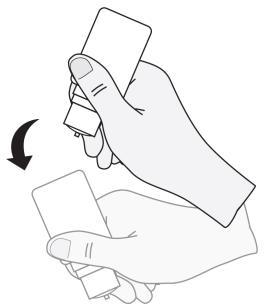
- 7. After use, before screwing the cap back on, you should shake the bottle downward without touching the dropper tip to remove excess liquid from the tip. This is necessary to ensure that the next drops can be administered.
- 8. After administering all doses, some Vizidor Duo will remain in the bottle. You should not be concerned, as there is extra Vizidor Duo in the bottle, and you will receive the full dose of the medicine prescribed by your doctor. After completing the prescribed treatment, you should not use the excess medicine remaining in the bottle.
You should not use the eye drops for more than 28 days after first opening the bottle.
Using more Vizidor Duo than prescribed
If you use more eye drops than prescribed or swallow any contents of the packaging, you may experience dizziness, difficulty breathing, or a feeling of slow heart rate. You should contact your doctor immediately.
Missing a dose of Vizidor Duo
It is important to use Vizidor Duo as directed by your doctor.
If you miss a dose of the medicine, you should use it as soon as possible. However, if it is almost time for your next dose, you should not take the missed dose and return to your regular dosing schedule.
You should not take a double dose to make up for a missed dose.
Stopping the use of Vizidor Duo
If you plan to stop treatment, you should talk to your doctor first.
If you have any further questions about the use of this medicine, you should ask your doctor or pharmacist.
4. Possible side effects
Like all medicines, this medicine can cause side effects, although not everybody gets them.
Usually, you can continue to use the eye drops, unless the symptoms are severe. You should inform your doctor or pharmacist if these symptoms worry you. You should not stop using Vizidor Duo without consulting your doctor.
If you experience allergic reactions, including hives, facial, lip, tongue, and/or throat swelling, which can cause difficulty breathing or swallowing, or severe skin reactions with blistering or peeling of the skin, you should stop using the medicine and seek urgent medical attention.
During clinical trials or after the medicine was marketed, the following side effects were reported in relation to Vizidor Duo or one of its ingredients:
Very common(occurring in more than 1 in 10 people)
- Burning and stinging in the eyes
- Unusual taste.
Common(occurring in no more than 1 in 10 people)
- Eye redness (in the eye or around the eye)
- Tearing or feeling of itching in the eye
- Corneal erosion (damage to the front layer of the eyeball), swelling, and/or irritation of the eye or around the eye
- Feeling of a foreign body in the eye
- Decreased corneal sensitivity (lack of feeling of a foreign body in the eye and lack of feeling of pain)
- Eye pain
- Dry eye sensation
- Blurred vision
- Headache
- Sinusitis (feeling of tension and fullness in the nose)
- Nausea
- Weakness and fatigue.
Uncommon(occurring in no more than 1 in 100 people)
- Dizziness
- Depression
- Uveitis
- Visual disturbances, including changes in refraction (in some cases due to the withdrawal of pupil-constricting medicines)
- Slow heart rate
- Fainting
- Breathing difficulties (shortness of breath)
- Indigestion
- Kidney stones.
Rare(occurring in no more than 1 in 1,000 people)
- Systemic lupus erythematosus (an immune system disease that can cause inflammation of internal organs)
- Numbness or tingling in hands and feet
- Insomnia
- Nightmares
- Memory loss
- Worsening of symptoms of myasthenia (muscle disease)
- Decreased sex drive
- Stroke
- Transient myopia, which may resolve after discontinuation of the medicine
- Detachment of the layer of the eye under the retina, which can cause visual disturbances
- Drooping of the upper eyelid (causing the eye to be half-closed)
- Double vision
- Eye lid sticking together
- Corneal edema (with symptoms of visual disturbances)
- Low eye pressure
- Ringing in the ears
- Low blood pressure
- Changes in heart rate or heart rhythm
- Chronic heart failure (a heart disease characterized by shortness of breath and swelling of the feet and legs due to fluid retention)
- Edema (related to fluid retention)
- Cerebral ischemia (reduced blood flow to the brain)
- Chest pain
- Palpitations (faster and/or irregular heart rhythm)
- Heart attack
- Raynaud's phenomenon, swelling, or cooling of the hands and feet, and impaired circulation in the hands and feet
- Leg cramps and/or leg pain when walking (claudication)
- Shortness of breath
- Impaired lung function
- Rhinitis or stuffy nose
- Nosebleeds
- Constriction of airways in the lungs
- Cough
- Pharyngitis
- Dry mouth
- Diarrhea
- Contact dermatitis
- Hair loss
- Skin rash with a white-silver appearance (rash similar to psoriasis)
- Peyronie's disease (which can cause curvature of the penis)
- Allergic reactions such as rash, hives, itching, in rare cases, possible swelling of the lips, eyes, and mouth, wheezing, or severe skin reactions (Stevens-Johnson syndrome, toxic epidermal necrolysis).
Frequency not known(frequency cannot be estimated from the available data)
- Strong heartbeat, which can be fast or irregular (palpitations)
- Accelerated heart rate
- Increased blood pressure
Like other eye medicines, timolol is absorbed into the bloodstream. This may cause similar side effects as those seen with beta-adrenergic blockers given orally. The frequency of side effects after local administration to the eye is less than with oral or intravenous administration. The listed side effects include reactions observed with beta-adrenergic blockers for ophthalmic use:
Frequency not known(frequency cannot be estimated from the available data)
- Low blood sugar levels
- Heart failure
- A certain type of heart rhythm disturbance
- Abdominal pain
- Vomiting
- Muscle pain unrelated to physical exertion
- Sexual disturbances
- Hallucinations
Reporting side effects
If you experience any side effects, including any not listed in this leaflet, you should tell your doctor or pharmacist. You can report side effects directly to the Department of Drug Safety Monitoring of the Office for Registration of Medicinal Products, Medical Devices, and Biocidal Products
Al. Jerozolimskie 181C
02-222 Warsaw
Phone: +48 22 49 21 301
Fax: +48 22 49 21 309
Website: https://smz.ezdrowie.gov.pl
You can also report side effects to the marketing authorization holder.
By reporting side effects, you can help provide more information on the safety of this medicine.
5. How to store Vizidor Duo
The medicine should be stored out of sight and reach of children.
Store in a temperature below 30°C.
After opening the bottle, this medicine can be stored for a maximum of 28 days.
Do not use this medicine after the expiry date stated on the carton and bottle after EXP. The expiry date refers to the last day of the month. Make sure the bottle is tightly closed.
Do not use this medicine if you notice that the seal on the bottle neck is broken before its first use.
Medicines should not be disposed of via wastewater or household waste. You should ask your pharmacist how to dispose of medicines that are no longer needed. This will help protect the environment.
6. Contents of the pack and other information
What Vizidor Duo contains
- The active substances of the medicine are dorzolamide and timolol. Each milliliter contains 20 mg of dorzolamide (as dorzolamide hydrochloride) and 5 mg of timolol (as timolol maleate - 6.83 mg).
- The other ingredients are: hydroxyethylcellulose, mannitol (E421), sodium citrate (E331), sodium hydroxide (E524), and water for injections.
What Vizidor Duo looks like and contents of the pack
Vizidor Duo eye drops, solution, is a clear, colorless, slightly viscous, aqueous solution, which comes in a 5 ml LDPE bottle with a dropper (made of HDPE and silicone) and an HDPE cap.
Pack size: 1, 3, or 4 bottles in a cardboard box.
Not all pack sizes may be marketed.
Marketing authorization holder
Bausch+Lomb Ireland Limited
3013 Lake Drive
Citywest Business Campus
Dublin 24, D24PPT3
Ireland
Manufacturer
EXCELVISION
27 st. La Lombardière, Zl La Lombardière,
07100 ANNONAY
France
PHARMATHEN S.A.
Dervenakion 6,
15351 Pallini (Attikis)
Greece
This medicinal product is authorized in the Member States of the European Economic Area under the following names:
Austria
Vizidor Duo 20 mg/ml + 5 mg/ml Augentropfen
Bulgaria
Oftidorix PF 20 mg/ml + 5 mg/ml капки за очи, разтвор
Croatia
Oftidorix PF 20 mg/ml + 5 mg/ml kapi za oko, otopina
Denmark
Vizidorduo
Ireland
Dorzolamide+Timolol PharmaSwiss 20mg/ml + 5mg/ml Eye Drops, Solution
Germany
Vizidor Duo 20 mg/ml + 5 mg/ml Augentropfen, Lösung
Poland
Vizidor Duo
Hungary
Dozopticum Duo 20 mg/ml + 5 mg/ml oldatos szemcsepp
United Kingdom
Vizidor Duo
Latvia:
Vizidorix 20 mg/ 5 mg/ ml acu pilieni, šķīdums
Lithuania:
Dorzolamide/Timolol Bausch 20 mg/5 mg/ml akių lašai (tirpalas)
Estonia:
Vizidor Duo
Slovakia:
Vizidor Duo 20 mg/ml + 5 mg/ml
Greece:
Vizidor Duo
Czech Republic:
Vizidor Duo
Finland:
Vizidorduo
Norway:
Vizidorduo
Sweden:
Vizidorduo
Cyprus:
Vizidor Duo
Date of last revision of the leaflet: 03/2025
- Country of registration
- Active substance
- Prescription requiredYes
- Manufacturer
- ImporterExcelvision Pharmathen S.A.
- This information is for reference only and does not constitute medical advice. Always consult a licensed doctor before taking any medication. Oladoctor is not responsible for medical decisions based on this content.
- Alternatives to Vizidor DuoDosage form: Drops, 50 mcg/ml + 5 mg/mlActive substance: timolol, combinationsManufacturer: Pharmaselect International Beteiligungs GmbHPrescription not requiredDosage form: Drops, (0.3 mg + 5 mg)/mlActive substance: timolol, combinationsPrescription requiredDosage form: Drops, 0.3 mg/ml + 5 mg/mlActive substance: timolol, combinationsManufacturer: Genetic S.p.APrescription required
Alternatives to Vizidor Duo in other countries
The best alternatives with the same active ingredient and therapeutic effect.
Alternative to Vizidor Duo in Spain
Alternative to Vizidor Duo in Ukraine
Online doctors for Vizidor Duo
Discuss dosage, side effects, interactions, contraindications, and prescription renewal for Vizidor Duo – subject to medical assessment and local rules.














